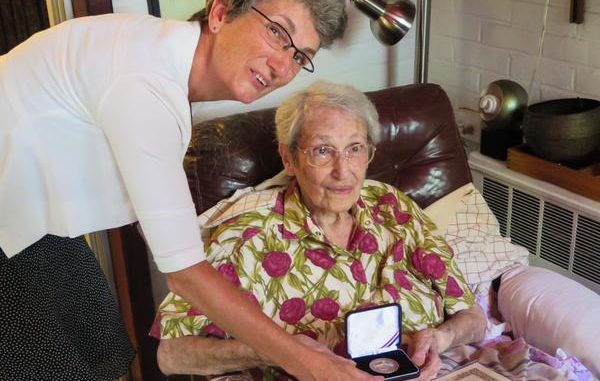
Consul General Wagener presenting Bergmann with her award in New York. (Photo: Courtesy Germany.info)
Gretel Bergmann, athlete, businesswoman, and icon of anti-discrimination in World War II, was awarded the German American Friendship Award this week in her home in New York. Today, she is a 101-year-old mother and grandmother, but in 1936, she was one of the best track and field athletes Germany had ever seen. She was dismissed from the Olympic team because she was Jewish and fled to the US to start a new life and a new sports career while war destroyed her home in Germany. In the sports community, Bergmann is considered a symbol of the ability to rise above discrimination. As a recipient of the German American Friendship Award, which was presented to her by Ambassador Peter Wittig and Consul General Brita Wagener, Bergmann represents a true, but tested, German-American connection.
Bergmann at the 1936 Olympics
Gretel Bergmann was born in 1914 to Paula and Max Bergmann. Her father was also an athlete and encouraged her from a young age to pursue her talents. In 1931, at age 17, she set her first German high jumping record after jumping 1.51 meters. While she was soaring to victory after victory, Jews across Germany were beginning to feel the pressure of Nazi persecution.
When the threat grew too great for her family to bear, they fled to Great Britain, where Bergmann proved her talent again and again on the track field. Yet, with the 1936 Olympics looming, Bergmann knew that to compete, she would have to compete for Germany. On the other hand, the Nazi government was facing threats of boycotts from other countries because of Germany’s treatment of its Jewish population. And so, when Bergmann was invited back to Berlin to compete for Germany, she accepted. Just one month before the Olympic Games were to begin, Bergmann was competing better than ever. Yet she was unceremoniously cut from the team due to her “poor performance.” That year, Germany failed to win gold in the high jump.
“Gold, it wouldn’t have been anything else,” said Bergmann when a reporter from Spiegel Online asked how she would have performed in her lost Olympics. “I wanted to prove to Germany and to the world that jews were not horrible people, not fat, ugly, and disgusting, like they were portraying us. I wanted to show them that a Jewish girl could defeat the Germans in front of 100,000 people.” Gretel Bergmann never got the chance to prove her skill. After being cut from the team, she emigrated to America and vowed never to return to Germany again.
Healing and Understanding
Since the Nazi regime fell, Gretel Bergmann’s story has become notorious; it is the quintessential story of a Jewish person who was bullied by the Nazis despite enormous talent. It never occurred to Bergmann, who had become a US citizen in 1942, to return to Germany after the war, even after athletic organizations began praising her story openly. In 1994, the German National Sports Federation named a stadium in Berlin after her. She was awarded prizes and streets were named after her. Her biographies quickly became bestsellers and movies were made about her story. Still, she didn’t return.
It wasn’t until 1999, when the stadium in her home town of Laupheim was renamed in her honor, that Gretel Bergmann returned to Germany. It was this stadium that initially barred her from competition long before the Olympic Games. It was here that she learned the skills that would make her famous, only to have her dreams trampled less than a decade later. When asked why she returned, she said it was because she worried that no one would understand why this building would be called “Gretel Bergmann Stadium.” “They will be told my story, and the story of those times,” she said. “I felt it was important to remember, and so I agreed to return to the place I swore I’d never go again.”
After returning to Germany, Bergmann said she now understood that the people who were naming streets and stadiums after her were not the same people who barred her 75 years ago. Since then, she has represented not the division of 1936, but the healing the last 75 years has brought.
Source: www.germany.info
______________________________________________________________________________________________